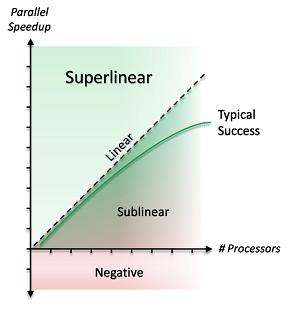In Fritz GUI you can play with 1 to 3 time handicap. So I played SF17 with 1 cpu and 3 minutes
against 3 cpus and 1 minute. UHO book used. Result here:
1 Stockfish 17 1cpu +40 +69/=85/-46 55.75% 111.5/200
2 Stockfish 17 3cpu -40 +46/=85/-69 44.25% 88.5/200
Surprisingly? 1 cpu has as average 4 plies more depth.
6 cores vs 1 core surprised me
Moderator: Ras
-
Jouni
- Posts: 3651
- Joined: Wed Mar 08, 2006 8:15 pm
- Full name: Jouni Uski
-
Werewolf
- Posts: 2028
- Joined: Thu Sep 18, 2008 10:24 pm
Re: 6 cores vs 1 core surprised me
No, as explained this is not surprising.Jouni wrote: ↑Mon Dec 30, 2024 7:35 pm In Fritz GUI you can play with 1 to 3 time handicap. So I played SF17 with 1 cpu and 3 minutes
against 3 cpus and 1 minute. UHO book used. Result here:
1 Stockfish 17 1cpu +40 +69/=85/-46 55.75% 111.5/200
2 Stockfish 17 3cpu -40 +46/=85/-69 44.25% 88.5/200
Surprisingly? 1 cpu has as average 4 plies more depth.
-
Ajedrecista

- Posts: 2123
- Joined: Wed Jul 13, 2011 9:04 pm
- Location: Madrid, Spain.
Re: 6 cores vs 1 core surprised me.
Hello:
Time to remember with a simpler graph:
Parallel Search - Chessprogramming Wiki

Parallel search of engines falls in the sublinear region. If anyone wants a near 50%-50% result, you would not want a 'N-core, 1-minute' vs '1-core, N-minute' approach. What about '2-core, 60-second' vs '1-core, 100-second' match?
This is, to be on pair in a 'N-core, t (time)' vs '1-core, T (time)' match, the tempting rule of the thumb N·t = 1·T; T = N·t does not work because we are not in the linear region and the multi-core engine needs to compensate the diminishing returns of the parallel search, hence N·t > 1·T; T < N·t. How much? It will depend on the engine (the SMP algorithm and its implementation) and the number of cores (N). For example, for a given engine, if you find a 1.7:1 = 17-vs-10 TC (time control) in 1 vs 2-core to be fair enough, you can not expect to hold 17:1 TC in 1 vs 10-core (it should be very favourable to the 10-core) and you must decrease to 5.75:1 = 23-vs-4 TC (or whatever) to still have a close match. It is an interesting experiment to find these points, indeed, if they have not being tested yet, which I do not know.
Regards from Spain.
Ajedrecista.
Time to remember with a simpler graph:
Parallel Search - Chessprogramming Wiki

Parallel search of engines falls in the sublinear region. If anyone wants a near 50%-50% result, you would not want a 'N-core, 1-minute' vs '1-core, N-minute' approach. What about '2-core, 60-second' vs '1-core, 100-second' match?
This is, to be on pair in a 'N-core, t (time)' vs '1-core, T (time)' match, the tempting rule of the thumb N·t = 1·T; T = N·t does not work because we are not in the linear region and the multi-core engine needs to compensate the diminishing returns of the parallel search, hence N·t > 1·T; T < N·t. How much? It will depend on the engine (the SMP algorithm and its implementation) and the number of cores (N). For example, for a given engine, if you find a 1.7:1 = 17-vs-10 TC (time control) in 1 vs 2-core to be fair enough, you can not expect to hold 17:1 TC in 1 vs 10-core (it should be very favourable to the 10-core) and you must decrease to 5.75:1 = 23-vs-4 TC (or whatever) to still have a close match. It is an interesting experiment to find these points, indeed, if they have not being tested yet, which I do not know.
Regards from Spain.
Ajedrecista.